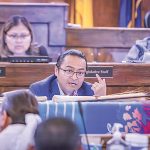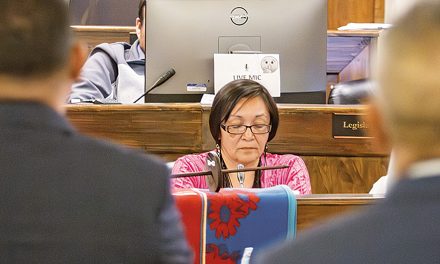
Letters | ‘Policy of empathy’ provides ‘unbelievable’ funds
I am writing to your newspaper to publicly express my appreciation for President Joe Biden’s “policy of empathy” toward Navajos.
The 2020 CARES Act provided relief from hardship during the COVID-19 public health crisis. The American Rescue Plan Act provided $1.8 billion to the Navajo Nation. The funding was unbelievable!
Our congressional delegations to Washington deserve a lot of credit as well. Their understanding of our communities’ needs helped get the funding. Navajo and Non-Navajos are sharing the money. And it is greatly appreciated.
I am also thankful to the president and our secretary of Interior, Debra Haaland, for restoring key provisions of the National Environmental Protection Act. The provisions ensure community safeguards, such as the Historic Preservation Act, during reviews of projects.
NEPA was scaled back by former President Trump to fast-track projects with false promises of jobs, etc.
Surely one remembers the Standing Rock protest which was against the crippling of NEPA, really, the crippling of the rule of law.
I am for stricter environmental review, but now am asking the president stary on course and eliminate the Trump rule maintained by the Supreme Court that curtails tribes’ right to review, approve and have oversight of projects.
Still, the bottom line is that our laws require an informed consent by the local community affected. Please restore the people’s oversight. Thank you.
Albert Shirley
Iyanbito, N.M.
Navajo economy is not doing well
I have grave concerns for the economy of the Navajo Nation. The current economic picture is not encouraging and hasn’t moved in a positive direction in decades.
We’ve consistently lost more jobs and revenue for the last 20 years. Three mines, one power plant closed and two failed attempts to revise grazing laws. That’s at least 1,500 jobs lost. Hundreds of millions of dollars in revenue lost.
Gaming and NTEC are the only bright spots.
The Oxford dictionary defines “economy” as the wealth and resources of a country or region, especially in terms of the production and consumption of goods and services.
Navajo folks are good consumers. We know this because there is a weekend exodus to border towns such as Farmington, Gallup, Flagstaff, Cortez and Page. They have healthy budgets to take care of their city residents.
So we know where the supply is and we demand it. Navajo tax folks just wish the supply was here on Navajo land.
The Navajo Reservation has plenty of agricultural land but most of it is overgrazed and overrun by feral animals. And suffers from a lack of enforcement.
The Navajo Nation is wealthy in natural resources: coal, oil, natural gas, methane, uranium and helium.
There is one coal mine and power plant left, which has a closure date of 2030. Oil and Gas are moving steadily with existing operations.
Newcomers, solar and helium, are off to a very slow start. Regardless of a world shortage of helium and increasing demand, this inert gas can’t seem to get to where it needs to go.
We have yet to realize the potential of methane for hydrogen fuel cell production and the Navajo Energy Storage Project is still making its way through the regulatory process so there is no timeline for construction. Construction could be years and years away.
However, activism is an active threat to further production of Navajo Nation’s natural resources and a threat to a healthy economy. If we can’t develop our natural resources then we’ll continue to see our youth leave and not come back. Jobs will never show.
Let’s not forget other resources such as labor and small businesses. Small businesses are plenty but during COVID-19 they just didn’t get enough attention from Navajo Nation government.
What about labor? We have a workforce but there is a limited number of jobs available.
We have an aging workforce and an annual brain-drain of graduates that intend to leave the reservation to start their education or careers. Most end up raising their families off the reservation and visit Navajo land on a limited basis.
Lastly, two-thirds of the Navajo population is living off the reservation.
So what do we do? How do we fix it?
We start by electing a president that wants to focus on the economy, Then we elect members of Council that will pass laws that support businesses and build a stronger economy.
That means we need a president that is pro-business, pro-development and pro-energy.
So pay attention to your candidate’s platform and listen to what they say when it comes to jobs, the economy and energy.
Jarvis Williams
Kayenta, Ariz.
Vote for me
Łeeyi’ tó is the Navajo word for the place known as Klagetoh and means “Water-in-the-ground.”
This place is located 39 miles north of Interstate 40 on U.S. Highway 191 in Arizona. Just north of the Klagetoh Express convenience store, you will find a water well located on my ancestral lands.
Recently, I returned to Klagetoh and memories from my youth flooded my mind, and the recollection of the family history passed down to me.
My late father Merwin told me that his mother was born in a hooghan nimasi, or hogan close by this water well. She and the line of mothers before her were of the Tsé ńjíkiní – Honeycomb-Rock-House-People – a clan that traces its roots back in this region of the country for more than one hundred generations.
My grandmother’s relatives built a rock house near to where she was born. Generations of Honeycomb-Rock-House-People lived in this house, and it stands to this day. The memories that I have of this place and the surrounding area are fond, but also, they are painful for they hold the fading images of loved ones long since passed.
Until recently, the funerals of my closest and dearest of relatives made me return. At the beginning of 2010, I carried out one of my father’s last wishes that his ashes be dumped on the hill overlooking my grandmother’s home on Tanner Springs Road in Wide Ruins, Arizona.
This homestead once belonged to my dad’s paternal grandmother – Mary Lynch née Yellowhorse.
My dad was the first in the family to be cremated. On one occasion, he told me why he chose to have his body cremated as opposed to being buried. He did not want people to cry on his corpse and embrace it for there was no way for him to respond in kind.
He instructed me and my siblings, “dump it on the hill overlooking grandma’s.”
The embracing of loved ones was ingrained into us, but more importantly, the teaching to have love for your relatives and for others. My father’s love for his family and fellow human beings could have filled oceans. He loved me so much that he understood the importance of burying my umbilical cord at my grandma’s place.
He buried it where the sheep corral once stood. In the Navajo way. This act forever tied me to this place.
Our homeland is everything to us. He wanted me to build a hogan on a specific spot up the way from my grandma’s. Truly, this place is home to me, and now, my heart answers a call to return and be of service to my people. The Lynches were made to be of service and have faithfully served through the ages.
May the memory of our honorable dead be blessed. May their prayers be heard that the land and the people be healed and made whole.
Elect Merv J. Lynch to delegate of the Navajo Nation Council representing Houck, Klagetoh, Nataha Dziil, Tse Si Ani, and Wide Ruins chapters.
Merv J. Lynch
Window Rock








 Highway 264,
Highway 264, I-40, WB @ Winslow
I-40, WB @ Winslow